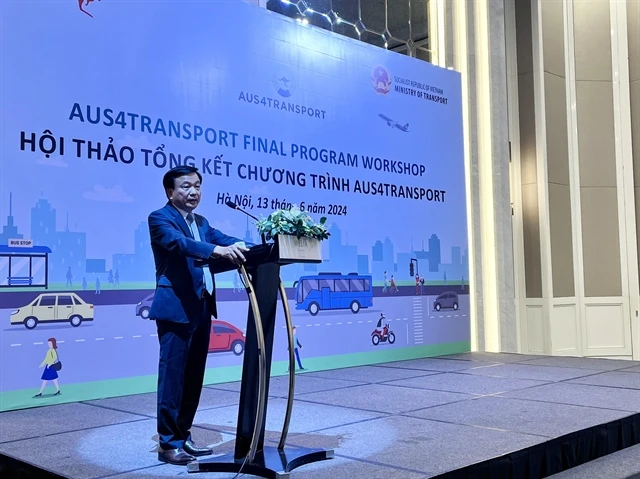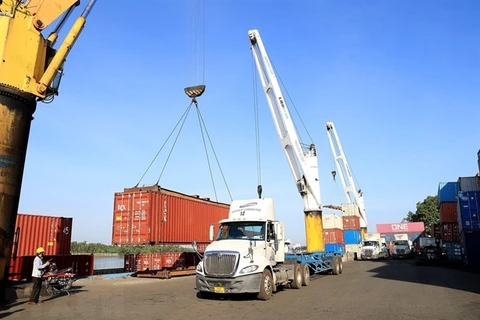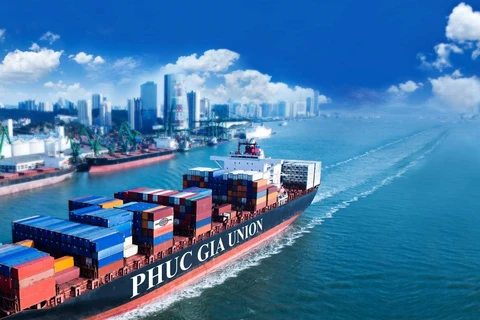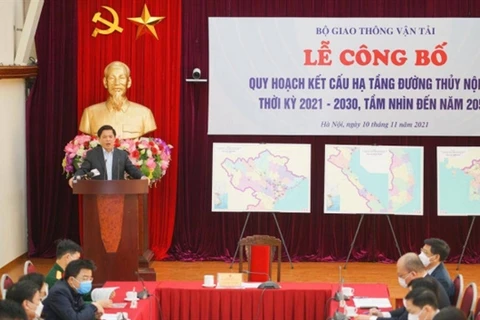
Hanoi (VNS/VNA) - Building inland waterway transport in Vietnam, supporting the development of low carbon transport and connecting ethnic minorities and farmers to the Greater Mekong Subregion economic corridor are some of the significant achievements of the Australia-funded programme Aus4Transport. After more than six years, the 30 million AUD (20 million USD) programme will be wrapped up at the end of this month.
The results were reported at the Aus4Transport final programme workshop held in Hanoi on June 13 by the Ministry of Transport and the Australian Embassy in Vietnam.
Aus4Tranpost is a long-term transport infrastructure development programme that aimed to increase investments in Vietnam’s transport infrastructure and contribute to an enhanced national transport network that supports inclusive socio-economic growth and alleviates poverty in the country.
The programme also helped normalise gender equality and social inclusion across the transport sector, support Vietnam’s efforts to reduce the road death toll, make e-Government a tangible reality for the transport ministry, boost shared prosperity and enable growth in the central region of Vietnam, as well as assist the transport ministry move towards a greener and more inclusive transport sector.
The programme started in early 2018 and will finish on June 30 after six and a half years.
In collaboration with the transport ministry, Aus4Transport has supported improvements in the sector’s capacity to design and develop high quality projects and bring them to market faster.
It has provided technical support for project preparation and development and helped secure access to high-quality financing for priority transport infrastructure.
Speaking at the event, Australia's Ambassador to Vietnam Andrew Goledzinowski said Aus4Transport had helped Vietnam to more quickly prepare high-quality projects at international standards to leverage over 445 million USD from the Multilateral Development Banks for transport infrastructure development.
The programme has supported capacity building at the transport ministry and its institutions and agencies.
“Together with My Thuan and Cao Lanh bridges, Aus4Transport will provide lasting links between the people of the two countries and positive momentum for future cooperation under our forthcoming development cooperation programme,” he said.
Deputy Minister of Transport Nguyen Danh Huy said: “I am proud of the work that we have done under Aus4Transport.”
He also added that he looked forward to the two countries working together on the Aus4Growth programme to support Vietnam’s ongoing economic development.
Kate McCubbin, head of Aus4Transport’s technical consultant team, said Australia and Vietnam have enjoyed a long and successful transport partnership spanning more than 30 years.
The partnership has seen Australia support the planning and construction of crucial national infrastructure, including the My Thuan and Cao Lanh bridges and inland waterways infrastructure in the Mekong Delta.
As part of that partnership, Aus4Transport was designed around 2017 and its goal was to increase investment in Vietnam’s transport infrastructure, leading to an improved national transport network that supports economic growth and poverty reduction.
“It marked an important shift, a shift from support infrastructure for hard infrastructure to soft infrastructure,” she said.
It was focused on enhancing processes and systems to improve strategic transport infrastructure management.
“This type of assistance was new to Vietnam,” she said.
“It was new to the Vietnam – Australian partnership,” she added.
The gold standard was based on a true partnership model aligned to both countries' strategic priorities. It also introduced a new approach whereby the transport ministry, the Australian Embassy and Aus4Transport worked side by side at each stage of project conception, design, development and implementation.
McCubbin noted that the programme also worked to support the Government of Vietnam’s commitment to e-Government and digital transformation through the development of three customised management information systems.
The systems were designed to support the specific requirements associated with officials from the transport ministry managing Vietnam’s large and complex transport infrastructure networks.
The Management Information System collects technical information from more than 17,000 km of water transport routes and inland waterways infrastructure, including 283 ports, 8,668 landing stages and 251,000 vessels.
The system helps to improve multi-modal transport connectivity, boost efficiency and improve environmental sustainability and key economic zones such as the Mekong and Red River deltas.
“We are looking forward to the further and deepening the partnership between our two nations,” she said./.






















